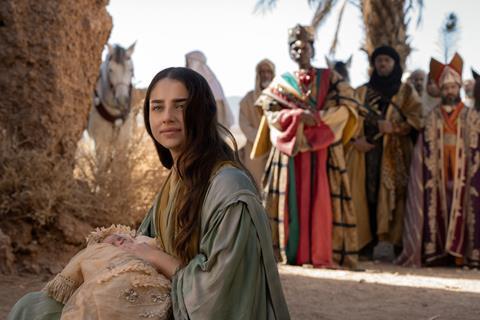Netflix’s Mary tells the story of the mother of Jesus before she became pregnant with the saviour. But is this biblical epic up to scratch? Giles Gough doesn’t think so

For many people, the genre of ‘Christian film’ is one that provokes a sense of trepidation. The memory of straight-to-video biblical epics with low production values and shmaltzy music lingers long in the memory. It is with some relief then to say that Mary manages to sidestep the vast majority of those tropes, although perhaps not quite all of them.
Canonically, the first chapter of Luke introduces us to Mary, but other than her name, location and the fact she was a virgin, we are given very little information about her, making her a topic ripe for fictional exploration. Gabriel tells her “You are favoured by the Lord!” (Luke 1:28) and finding out why she was so favoured appears to be the starting point for screenwriter Timothy Michael Hayes and director DJ Caruso.
Cast and crew
The story opens with Mary’s father, Joachim, walking in the desert fervently praying for a child. He is met by a subtle, yet otherworldly Gabriel, wrapped in a familiar blue shawl, who tells him that he will have a daughter. From there we follow the story of Mary from her birth and adolescence, all the way through to her giving birth to Jesus and the holy family’s flight into Egypt.
Noa Cohen sensitively plays Mary, and it’s pleasing to see that her relationship with Joseph (Ido Tako) is not treated as an after-thought. It has always been part of my own biblical head-canon that Mary and Joseph were something of a package deal, that if Joseph would be tasked with raising the son of God he would have to be “highly favoured” as well. This film does a great job of conveying that view and it was clearly important to Caruso, who told the National Catholic Register: “I also feel, even for the younger audiences, they’re seeing that Mary and Joseph are young adults…It’s two young people that are in this together. That was definitely my intent because I think it can open up her story.”
Dudley O’Shaughnessy does a great job of portraying Gabriel as something other than human, his performance making it clear why the archangel has to start every conversation with the words: “Do not be afraid!”
Sir Anthony Hopkins plays the dastardly Herod. Hopkins looks like he is having a great time playing a character who is one step away from a pantomime villain, and you begin to look forward to his scenes almost as much as he clearly did.
Costumes and plot
While Caruso is a practising Catholic, he appears to have drawn widely from different sources for this story. The protovangelium of James is cited by Caruso as an inspiration and Hayes apparently consulted with Christian, Jewish, and Muslim leaders and scholars while writing his original screenplay. The lack of detail on Mary’s early life is a gift to writers, but it does mean that if you hold to any one specific interpretation you may be disappointed.
I will leave the deeper analysis of historical accuracy to the scholars, but it is fair to say that the film does occasionally dip into spiritual warfare Christian fantasy, which tonally feels a bit jarring - although it’s no more intrusive than what Mel Gibson did in The Passion of The Christ. Essentially, if we think of The Chosen as the high watermark for biblical storytelling, this falls a little bit short of that. But don’t worry, there’s no rock monsters building the ark as in 2014’s Noah.
If anything, it’s the wardrobe choices that raise an eyebrow. Any fears about the production values are quickly allayed, but sometimes the costume flourishes seem to owe more to Dune than the Gospels. In moments of solemn importance and narrative tension, it’s distracting to find yourself thinking: “Did they really wear hats like that?” But, as the script apparently underwent 74 revisions before shooting, I’m inclined to give them the benefit of the doubt.
While this is a solid piece of filmmaking, it is a tough one to connect with. Perhaps the fact that it is arguably the most famous story in the world means there’s very little dramatic tension. Every time Mary is put in danger, it’s hard to generate an emotional response because we know what’s going to happen. She has the strongest plot armour in history to keep her safe.
We are given very little information about Mary, making her ripe for fictional exploration
That said, some of the scenes during the massacre of the innocents are hard to watch. Caring for a newborn is difficult enough without having to deal with bloodthirsty soldiers hunting you down. If these scenes were powerful at all, it may be in the way it unintentionally foreshadows the ongoing conflict in Gaza. With the UN reporting that 70 per cent of verified victims over a six-month period were women and children, these scenes highlight the barbarity of turning the military on a defenceless civilian population.
Where are they from?
Perhaps the most distracting thing in this film is some of the casting choices. With more and more biblical epics casting Middle Eastern actors to more authentically portray the roles, we’ve come a long way from blonde-haired, blue-eyed depictions of Jesus. So it seems jarring to still have white actors playing first century Jewish characters.
The most famous story in the world means there’s very little dramatic tension
Some of this is understandable; In a saturated media landscape, a big name like Sir Anthony will draw audiences to the film. But Caruso’s decision to select the primary cast from Israel “to ensure authenticity” but none from Palestine is, at best, a wilful misunderstanding of historical facts. At worst, it is yet another attempt to whitewash the Bible.
Ultimately, this film is Caruso’s own personal take on the most revered woman in history. Though the director clearly had a sincere desire to bring a fresh perspective to Mary, so much of this feels like it has been done before.
Mary is available to watch now on Netflix






































5 Readers' comments